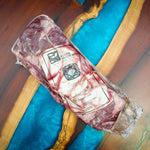
Chapter 1: Primordial Pastures
Approximately 1.8 million years ago, during the Pleistocene epoch, a significant transformation was taking place in the evolutionary journey of early humans. Among the notable species of this period was Homo erectus, who made a discovery that would profoundly shape the trajectory of human civilization: the controlled use of fire.
The mastery of fire, which likely began around 1.5 to 1 million years ago, marked a turning point in human evolution. Homo erectus and other early hominins learned to harness fire not only as a tool for warmth and protection but also as a revolutionary means of preparing food. The ability to cook meat over open flames represented a significant culinary advancement, making previously tough and fibrous cuts more palatable and easier to digest.
The landscapes these early humans inhabited were teeming with formidable animals such as aurochs, mammoths, and other large herbivores. These creatures, once considered adversaries in the struggle for survival, became essential sources of nutrition. The controlled use of fire allowed early humans to extract more calories and nutrients from their food, giving them a distinct advantage in the harsh environments they faced.
The advent of cooking also had profound social implications. Gathering around a fire to share cooked food fostered a sense of community and cooperation among early humans. These communal meals likely played a role in the development of social structures and cultural practices that are integral to human societies today.
In this early chapter of human history, the relationship between humans and fire was more than a mere survival strategy; it was a catalyst for social and biological evolution. The act of cooking not only enhanced the nutritional value of food but also laid the groundwork for the development of culture and civilization.
Thus, the story of beef and its preparation can be traced back to these ancient times, where the primal flames of early fires began a tradition that would be passed down through countless generations. The mastery of fire and the art of cooking were not just milestones in human history; they were the foundations upon which the future of humanity was built.





